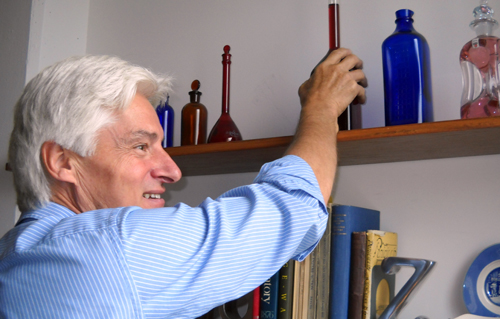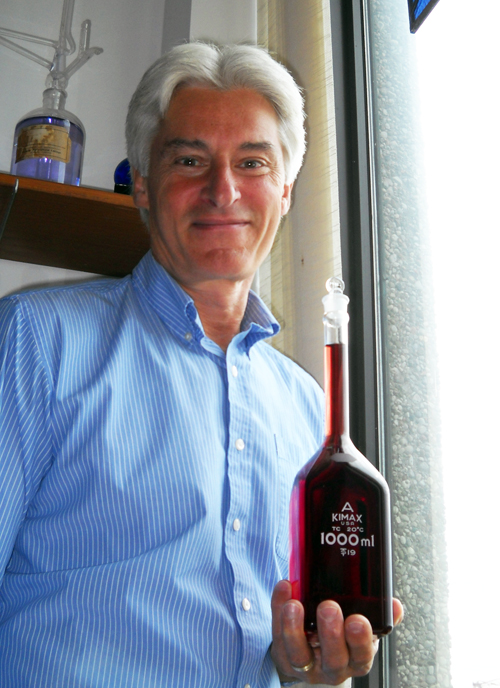
Since coming to Guelph decades ago for an intended two-year stint, Prof. Anthony Clarke has taught several generations of students outside of his intended field, studied microbes in hopes of helping develop new antibiotics and energy sources, and taken on numerous, mostly unexpected, administrative roles.
Clarke arrived in 1986 to take up a contractually limited appointment in the chemistry department. Early on, he was eyeing a tenure track position opening in the department. When a posting came up in the microbiology department, he took another professor’s advice to apply, even just as a “test case.” He got the job.
He’s been in microbiology ever since, including chairing the department – now part of today’s Department of Molecular and Cellular Biology – from 1995 to 2000.
Back in the mid-’80s, both his teaching and his research interests turned out to be a good fit for his new department. Several faculty members were interested in bacterial cell surfaces and antibiotic resistance, and they were looking for a biochemist – Clarke’s specialty as a grad student at the University of Waterloo.
Guelph microbiologists were also part of the national centres of excellence called the Canadian Bacterial Diseases Network, which ran for 12 years. “That’s how I got to connect and work with some of the best microbiologists in the country,” he says.
Clarke looks at how bacteria build and modify their cell surfaces, using enzymes to mortar together sugars, amino acids and proteins. That cell wall protects the microbe and keeps it intact. But as the cell grows or divides, it has to strip down and rebuild its defences. That’s when the cell is more vulnerable to drug treatment. Focusing on reactions involving those microbial enzymes, Clarke hopes to find drug targets for antibiotic therapy.
That might help doctors and drug companies looking for new treatments for various pathogens. A number of bugs have developed resistance to conventional treatment and are responsible for a growing number of hospital- and community-acquired infections, including methicillin-resistant Staphylococcus aureus and vancomycin-resistant enterococci.
In 2009, Clarke became co-leader of the new Canada/U.K. Partnership on Antibiotic Resistance, a collaboration of the Canadian Institutes of Health Research (CIHR) and the U.K. Medical Research Council. That project ends next year.
Now he and other scientists in the United Kingdom and France are applying for a new funding partnership involving the CIHR and the European Union. The group hopes to help find new enzyme inhibitors as potential drug leads for pharmaceutical companies.
This is curiosity-driven research, he says. “You have to have a lot of creativity and imagination.” That involves “proposing what might be happening and designing experiments to test it.”
Substitute “good” bugs for bad ones and you find another avenue for Clarke’s interests in enzymes and cell walls. This time, it’s not for battling pathogens but for finding potential new energy resources. He’s interested in how micro-organisms break down plant material, particularly tough cellulose fibres. By unlocking plant biomass sugars, energy companies might be able to make cellulosic ethanol as a green alternative to fossil fuels, says Clarke.
Six years ago, he teamed up with U of G physics professor John Dutcher and chemist Jacek Lipkowski on this project. They have received funding from the Natural Sciences and Engineering Research Council.
Clarke started working with cellulases – enzymes that break down cellulose – decades ago as a research associate at the National Research Council in Ottawa. He’d been there for 18 months before realizing that he was missing an academic environment. At a meeting in Toronto, he ran into Guelph biochemist Janet Wood. “She invited me to apply for the contractually limited position.” He brought that cellulose project with him to U of G.
Clarke had gotten interested in sugar-based enzymes during an earlier post-doc at the Carlsberg Research Centre in Copenhagen, Denmark.
Enzymes themselves – or at least their study – sparked a delayed reaction in him as an undergrad student in chemistry and biology. At high school in Burlington, Ont., he’d rigged up a homemade X-ray device to cause mutations in onion root chromosomes.
Referring to his undergrad years, he says, “I drifted through university as a C student.”
Things changed when he began a senior research project on a bacterial enzyme that thwarts antibiotics, including penicillin and cephalosporins. Besides the project itself, he says he was lucky to encounter biochemistry professor Thammiah Viswanatha. His mentor identified certain qualities in him, including enthusiasm and an ability to grasp concepts. “I became an A student overnight.”
Clarke completed his master’s degree at Waterloo in 1980 and his PhD there in 1983.
He has paid that mentorship forward while supervising his own grad students at U of G. In an At Guelph story last fall, PhD student Patrick Moynihan said he had wrestled with self-doubt. “All through my master’s, I was not sure how good a scientist I was,” said Moynihan. After he confessed his uncertainty to his supervisor, Clarke told him: “’No question you have the ability.’ It felt good to have someone say that.”
Early this year, Moynihan went to the University of Birmingham with a post-doc fellowship under that Canada/U.K. research partnership.
Although he still checks in with his research lab every day, Clarke has taken a break from teaching for the past three years to focus on his administrative duties. His unit runs 90 graduate programs involving more than 2,500 students. Pending programs include a PhD in bioinformatics and a new partnership allowing Guelph MBA students to do project work at an Austrian business school.

Clarke has played a number of administrative roles at Guelph, less by design than by circumstance, he says. Along the way, he has served as acting dean of the College of Biological Science, assistant vice-president (academic), acting associate vice-president (research) and acting associate VP (academic).
He was involved in planning for what would become the Summerlee Science Complex and chaired the steering committee for the new Pathobiology/Animal Health Building. He was also the administrative representative for renovations to the Thornbrough and Richards buildings as part of Guelph’s new engineering complex. Those projects allowed him to work not only with other administrators and faculty but also with the project architects and engineers.
“I like to swing a hammer myself,” he says. In Guelph, he has bought and renovated five homes, including fixer-uppers that he and his wife, Lee Anne Clarke, helped to buy for each of their kids when they enrolled at U of G.
Michael, now 31, studied fine art. Andrew, 30, took history. Chelsea, 29, studied microbiology and completed a master’s at Western University.
Anthony and Lee Anne also own the Huntsville-area cottage that he and his brother built with their engineer father in 1970.
Lee Anne is business manager with the Central Student Association, where she has worked for more than 25 years.
Speaking of his varied roles on campus, Clarke offers a lesson learned. “Don’t turn down opportunities – and test your limitations. I had no idea I would be an effective academic administrator.”